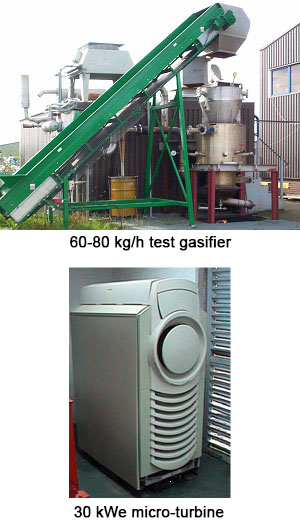Project Profile #2
60-80 kg/h test biomass and waste gasifier coupled to a Capstone micro gas turbine, Newton-le-Willows, England (2002-2004).
To download this project profile in PDF format click here.

Project Background
Micro-turbines can be considered as another possibility as a prime mover for power generation from biomass-derived producer gas. To this end, a project, financially supported by the UK DTI, in conjunction with Advantica Technologies was instigated. The primary aim of the project was to operate a Capstone 30 kWe (natural gas) micro-turbine on producer gas at Biomass Engineering Ltd.'s facilities. C.A.R.E. Ltd. conducted the techno-economic assessment of the trials at Biomass Engineering Ltd. and cost projections for systems from 50 to 250 kg/h fuel input.
Project summary
The project was initiated in 2002, supported by the UK DTI, to couple an existing 80 kWe test gasifier to a Capstone micro-turbine. Initial testing took place at Advantica's research laboratories in Loughborough, passing synthetic producer gas over catalyst blocks to check the flammability of the gases, which proved that the gases could be easily ignited, and achieve very low slippage of CH4 at less than 2.5wt% (CH4 input basis). Operation of the Capstone micro gas turbine [MGT] on 100% producer gas was achieved successfully at a net electrical output of 5.5 kWe with very low NOx emissions (< 2 ppm).
The micro-turbine was then transferred to Biomass Engineering Ltd. facilities. At their facility, 350 hours of operation were obtained on actual producer gas and over 800 on natural gas. There were problems in start-up, due to limited access to the control software for the turbine and grid sensitivities causing issues with synchronisation of the power produced to the grid frequency. Emissions from the MGT were satisfactory with consistently low levels of NOx, COx and CH4.
C.A.R.E. Ltd. work
C.A.R.E. Ltd. re-designed an existing 30-50 kg/h gasifier to increase its throughput and improve the gas quality. The gasifier is generally used as test unit and a variety of feedstocks have been used. New filtration systems have also been tested, as specified by C.A.R.E. Ltd. The gasifier is capable of producing a very low tar (less than 12 mg/Nm3), low particulate gas of consistent high calorific value (> 5 MJ/Nm3 for wood feedstocks). The unit has been successfully coupled to two different engines, a Perkins 1000 series engine and an Iveco 8210 SRG engine, and has demonstrated the capability to generate consistent, guaranteed levels of heat and power, as evidenced by over 2500 hours on an installation in Northern Ireland and over 2000 hours operation on their test unit at Newton-le-Willows.
C.A.R.E. Ltd. completed a techno-economic assessment of the whole biomass gasification system from delivered wood chip to electricity and heat output. Data for a range of costs are given in Table 1. The net electricity production costs were excessively high, ranging from > 65p/kWh at 11 kWe output to 22 p/kWh at 108 kWe net output, based on wood fuel cost of £25/t delivered to site. The key factors are the MGT unit costs and the gas compressor costs, followed by the feedstock cost. Previous work has shown that the feedstock costs have one of the largest influences on the electricity production cost.
The electricity production costs are extremely high, due to the substantial turbine deration and very low overall efficiency of only 10.4% - less than a steam cycle at this capacity. This is a very high price for such a system, as each increment of 15 kWe is an additional MGT. The sale of heat can reduce the net electricity production cost by 10% for 108 kWe output and a zero cost feedstock, which is a very minor improvement. CHP therefore has a very minimal potential to make a significant cost impact for a gasification + MGT system. To compare with a gas engine system, a similar engine system would have net electricity production costs of 15.5 –7.7 p/kWh at 50kg/h biomass input, 42 kWe net output. All costs taking wood fuel cost of £25/t delivered to site. Compared to a biomass gasification plus gas engine system, operating at electrical outputs in the top end of the range from 90-110 kWe, the MGT system is 3-4 times more expensive in terms of electricity production cost.
Under present circumstances, there is very little prospect for gasifier + MGT systems to be commercially viable using the Capstone C-30 or C-330. To improve the economics substantially, i.e. reduce costs by a factor or 4, turbine deration would need to be zero, and preferably larger 250 kWe turbines would be used. Therefore more work is required on other small-scale turbines with long duration testing to assess technical and economic performance.
Project status
No further work was carried out, due to the high perceived costs of using micro gas turbines.